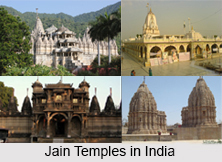 History of Jainism in India evolved when the Hindus are in tyrant rule in whole India. Jainism has evolved from the north Indian states like Bihar, Uttar Pradesh, Punjab, Rajasthan and the western regions like Maharashtra and Gujarat. Jainism is one of the most ancient religions in India. This religion is revealed to have been in existence in every cyclic period of the universe. Historians claim that the invasion of Muslim rulers in India led to the decline of Jainism to a major extent. However, Jains were allowed to pursue their religion under Hindu and British rulers.
History of Jainism in India evolved when the Hindus are in tyrant rule in whole India. Jainism has evolved from the north Indian states like Bihar, Uttar Pradesh, Punjab, Rajasthan and the western regions like Maharashtra and Gujarat. Jainism is one of the most ancient religions in India. This religion is revealed to have been in existence in every cyclic period of the universe. Historians claim that the invasion of Muslim rulers in India led to the decline of Jainism to a major extent. However, Jains were allowed to pursue their religion under Hindu and British rulers.
Origin of Jainism
According to historians, Jainism originated during 3000 to 3500 B.C., as many ancient idols identified as Lord Rishabha and other saints were discovered at Harappa and Mohenjo-Daro. There are evidences that prove, the people of the Indus Valley civilization worshipped the idols of Yogis. It can be presumed that it originated earliest in a period, when the new doctrine of the souls appeared. The "Swastika" signs have been found engraved in several seals, indicating that Jainism existed in the pre-Aryan period as well. The Vedic scriptures and Buddhist literature contains references about Jainism as an ancient religion.
 Ancient History of Jainism
Ancient History of Jainism
Jains consider that religion is eternal and imperishable, it is without any beginning and it will never cease to exist. It may be forgotten from time to time. It has been said that 24 Tirthankaras or Prophets had appeared in the history of Jainism who had shaped the foundation of Jain thought. According to historical records, Lord Parashvanath was the predecessor of Lord Mahavira.
Medieval History of Jainism
The medieval history of Jains states that the influence of Jainism as a religion had declined in India under the Islam rulers. Conquests from several Muslim rulers brought down the stronghold of the Jains. Several atrocities were meted out to the Jain followers. Many Jain temples and books were destroyed by the Muslim rulers. On the other hand, under the Hindu rulers, the conditions of the Jains were much better. Unlike the torture which the Islam rulers carried on the followers of Jainism, the Hindu rulers in many cases encouraged the growth of Jainism.
Modern History of Jainism
Jains could pursue their religious practices under the British rule, unhindered by political confusion. Practice of Jainism under the British East India Company in India and the British Government in India promoted the growth of trade. The major part of the community lived from it, and thus raised the standard of living of the big Jain businessmen. About the growth and gradual progress of Jainism, it can be said that in spite of its glamour, the numerical strength of the communities have constantly gone down. The reason for the constant decrease among the followers of Mahavira"s religion is the conversion of a great number of laymen to Hinduism which was constantly growing in strength.




















